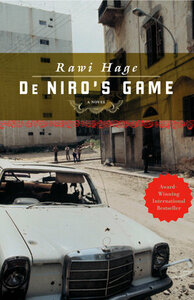Take a photo of a barcode or cover
This is an eye-opening account of the civil war in Beirut and what it takes to survive in such a setting. Rawi's writing style with short, aggressive sentences made the violence jump off the page.
adventurous
dark
emotional
informative
reflective
sad
medium-paced
Plot or Character Driven:
A mix
Strong character development:
Yes
Loveable characters:
Yes
Diverse cast of characters:
Yes
Flaws of characters a main focus:
Yes
Rawi Hage's use of language is superb. He successfully melds magical and wondrous metaphors and allusions into a taut, tightly-wound narrative that is brutal, blunt and tears away human artifice. Bassam is an ambivalent character; I didn't love or hate him, but I felt great pity and sadness for his character that had been defaced by the rigours of the prolonged war.
Many passages I read, and then had to immediately re-read. I love this one:
He pulled out a small bag, and we rolled oily hash into a thin sheet that we cut, with giant scissors, from the drape of the stretched-out sky. Moustafa passed his tongue along the edge of the sheet, and the liquid, like carpenter's glue, sealed it. I extended my arm and picked a light from a burning star, and Moustafa grabbed the wind and squeezed it in his chest. Then he passed the wine, the sky, and the fire to me, and I pulled it all these toward my lips, and like a black hole I sucked them in, held them, released them. (page 188)
I would highly recommend this multiple-award-winning book.
Many passages I read, and then had to immediately re-read. I love this one:
He pulled out a small bag, and we rolled oily hash into a thin sheet that we cut, with giant scissors, from the drape of the stretched-out sky. Moustafa passed his tongue along the edge of the sheet, and the liquid, like carpenter's glue, sealed it. I extended my arm and picked a light from a burning star, and Moustafa grabbed the wind and squeezed it in his chest. Then he passed the wine, the sky, and the fire to me, and I pulled it all these toward my lips, and like a black hole I sucked them in, held them, released them. (page 188)
I would highly recommend this multiple-award-winning book.
4.5 a less critical me would have 5 starred it but due to lack of .5 i will try and refrain from diming out 5s
I read this book last summer and picked it up at the library for two reasons; the first is because Mr. Hage lives in Montreal and I wanted to support a fellow Quebecer, and two because I grew up as a neighbour to a Lebanese family in MA., and often heard about the wars in this country.
If you don't mind that it contains a violent plot, this book is for you. I was interested in the characters which Hage does a fine job of defining for the reader. I could easily imagine the story being picked up as a screenplay and turned into a film. An easy read on the whole and I look forward to reading more of Hage's work.
If you don't mind that it contains a violent plot, this book is for you. I was interested in the characters which Hage does a fine job of defining for the reader. I could easily imagine the story being picked up as a screenplay and turned into a film. An easy read on the whole and I look forward to reading more of Hage's work.
I read Hage's [b:Cockroach|3994659|Cockroach|Rawi Hage|https://d.gr-assets.com/books/1327972052s/3994659.jpg|4040733] last year, and was not looking forward to picking up this one. As a matter of fact, had it not won the International Impac Dublin award, I wouldn't have bothered. I'm glad I bothered.
This book is about two friends who grow up amid the war in Lebanon. Hage's writing is exceptionally beautiful, especially since he writes about death, and bombs, and beatings, and blood. I found it visually stark, but so compelling I could not put it down. It helps, I suppose, that I recently also read Camus' [b:The Stranger|49552|The Stranger|Albert Camus|https://d.gr-assets.com/books/1349927872s/49552.jpg|3324344], for it definitely plays into the story.
As I turned the very last pages of this book, I literally sighed. This was one really well-written story, and Hage has earned another look from me.
This book is about two friends who grow up amid the war in Lebanon. Hage's writing is exceptionally beautiful, especially since he writes about death, and bombs, and beatings, and blood. I found it visually stark, but so compelling I could not put it down. It helps, I suppose, that I recently also read Camus' [b:The Stranger|49552|The Stranger|Albert Camus|https://d.gr-assets.com/books/1349927872s/49552.jpg|3324344], for it definitely plays into the story.
As I turned the very last pages of this book, I literally sighed. This was one really well-written story, and Hage has earned another look from me.
I’ve wavered over this one. This is a difficult novel to rate accurately since different aspects of struck or repelled me for entirely different reasons. There’s something remarkable in Rawi Hage’s prose and its sense of detachment. He is never trite or sentimental about war. It is always straightforward and brutal, in the way a person who fully witnessed it can communicate. There is death and torture and gore and ten thousand bombs falling all the time, and the writing certainly evokes the banality of it all. Another bomb, another death, another loss.
The division of the story into three parts/“places” didn’t always work for me, but I did find Bassam’s time in Paris in the third part the most engaging, and after reading slowly through the first two parts, finished the last within the span of a day. While the first two deal with the horrors of war on the ground and the unthinkable things people can do to ensure their survival, the plot itself didn’t feel as grounded. There were many characters coming and going, and it wasn’t always easy to follow what Bassam and George were up to at any given time. Given the book copy’s emphasis on the diverging fates of the two men, I thought the book would play up those parallels more, but this wasn’t the case in my interpretation, given the story was told through only one man’s eyes.
This book has a strange kind of tragedy to it. So many fates are out of the control of the characters, and yet, nobody is fully innocent either. Bassam could surely be seen as a villain whose only language is violence and intimidation. His attitude towards women is repulsive, which in turn repelled me from him as a character. There’s no black-and-white good and evil here. Everyone does things to protect others and themselves, and there are many costs. That makes this a less straightforward read, and one that is harder to objectively “like.”
Hage is undoubtedly a gifted writer whose style is perfectly suited to a story set in a place of such upheaval. This book is not an easy read, and not one suited to every kind of reader, but I can certainly see why it received such universal acclaim, both in Canada and internationally.
The division of the story into three parts/“places” didn’t always work for me, but I did find Bassam’s time in Paris in the third part the most engaging, and after reading slowly through the first two parts, finished the last within the span of a day. While the first two deal with the horrors of war on the ground and the unthinkable things people can do to ensure their survival, the plot itself didn’t feel as grounded. There were many characters coming and going, and it wasn’t always easy to follow what Bassam and George were up to at any given time. Given the book copy’s emphasis on the diverging fates of the two men, I thought the book would play up those parallels more, but this wasn’t the case in my interpretation, given the story was told through only one man’s eyes.
This book has a strange kind of tragedy to it. So many fates are out of the control of the characters, and yet, nobody is fully innocent either. Bassam could surely be seen as a villain whose only language is violence and intimidation. His attitude towards women is repulsive, which in turn repelled me from him as a character. There’s no black-and-white good and evil here. Everyone does things to protect others and themselves, and there are many costs. That makes this a less straightforward read, and one that is harder to objectively “like.”
Hage is undoubtedly a gifted writer whose style is perfectly suited to a story set in a place of such upheaval. This book is not an easy read, and not one suited to every kind of reader, but I can certainly see why it received such universal acclaim, both in Canada and internationally.
I know I am supposed to love this book. I didn't.
This was just a little too artistic for me, I think a great story got lost in all the poetic writing.
Please don't throw things at me and yell 'you dont appreciate art'! The writing is very artistic and obviously Rawi Hage has talent, I just didnt like this story being told that way.
This was just a little too artistic for me, I think a great story got lost in all the poetic writing.
Please don't throw things at me and yell 'you dont appreciate art'! The writing is very artistic and obviously Rawi Hage has talent, I just didnt like this story being told that way.
4.5, rounded up.
The apathy and nonchalance that the main character views the world with is such a stark contrast to the horrible events he lives through. Heartbreaking but unfortunately a very real book. Will be reading more from Rawi Hage
The apathy and nonchalance that the main character views the world with is such a stark contrast to the horrible events he lives through. Heartbreaking but unfortunately a very real book. Will be reading more from Rawi Hage
challenging
dark
emotional
tense
medium-paced
Plot or Character Driven:
Character
Strong character development:
Yes
Loveable characters:
Complicated
Diverse cast of characters:
Yes
Flaws of characters a main focus:
Yes






